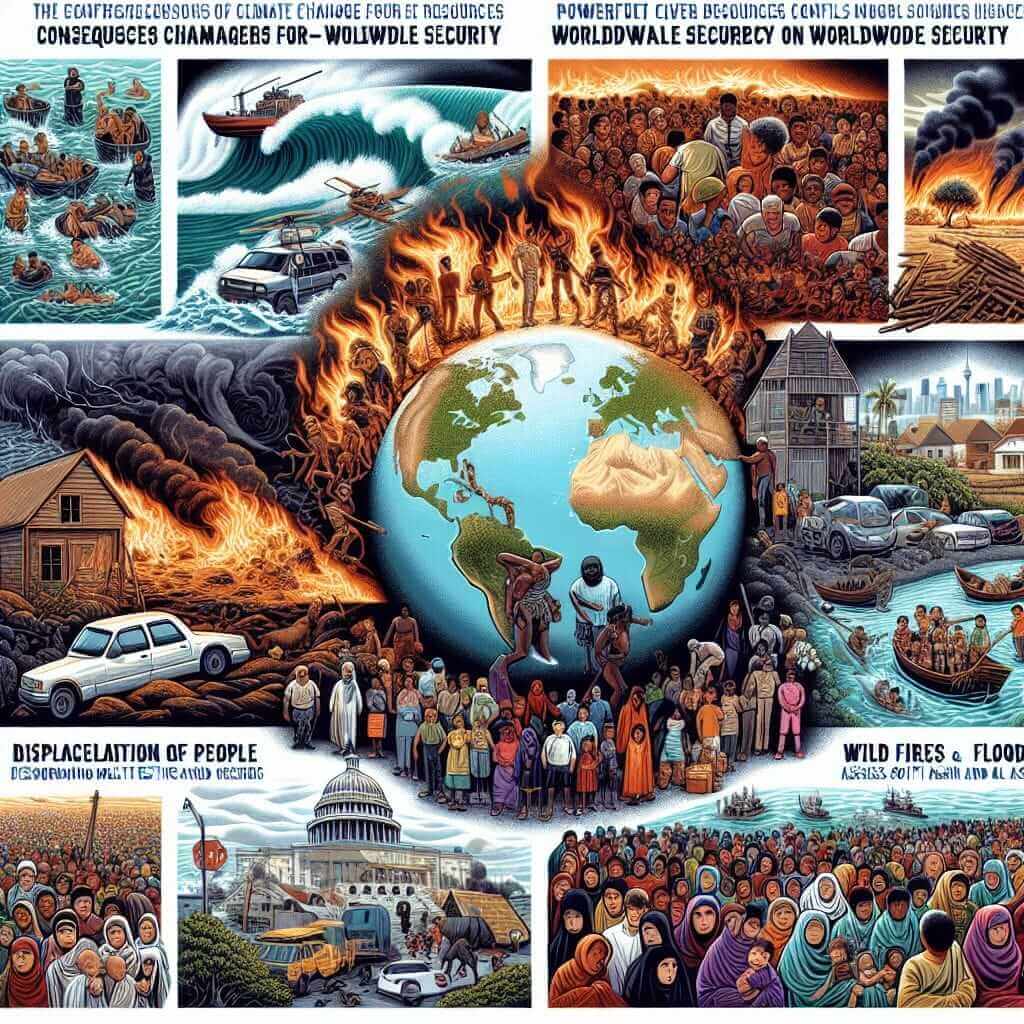The IELTS Reading section features texts on various subjects that test your skimming, scanning, and in-depth reading skills. One recurring theme gathering attention is how climate change affects global security strategies. Given the rising concerns around climate change, its impact on global security is a highly probable topic for the IELTS Reading section. By familiarizing yourself with such topical subjects, you can better prepare for real IELTS exam scenarios.
Reading Passage: Climate Change and Global Security Strategies
Reading Passage (Medium Text)
Climate Change: A New Dimension of Global Security
Climate change is no longer a distant environmental issue; it has become a pressing global concern affecting multiple facets of life, including security strategies. Traditional security approaches, once centered around geopolitical and military threats, are being reframed to incorporate climate risks. This paradigm shift is necessitated by the increasing frequency and severity of climate events such as hurricanes, floods, and droughts, which destabilize regions and exacerbate conflict conditions.

One crucial aspect is the impact of climate change on resource distribution. Scarcity of water and arable land is sparking rivalries among nations, heightening the risk of conflicts. For instance, in regions like the Middle East and North Africa, water scarcity has significantly contributed to social unrest and displacement, further complicating existing geopolitical tensions.
Moreover, climate change is accelerating migration trends. Environmental refugees are seeking asylum from deteriorating living conditions, leading to demographic shifts that challenge national and international security frameworks. The infiltration of refugee populations into more stable regions complicates local economies and can potentially lead to xenophobic and nationalistic responses, spiraling into violence.
Additionally, climate change affects military logistics and operations. Extreme weather conditions can disrupt military supply chains, damage infrastructure, and limit mobility. Consequently, nations are increasingly integrating climate resilience into their defense strategies. The U.S. Department of Defense, for instance, has identified climate change as a “threat multiplier,” acknowledging that climate-related instability exacerbates existing threats and creates new security challenges.
In conclusion, climate change is reshaping global security strategies in unprecedented ways. While international cooperation is critical to mitigate these risks, nations must proactively adapt their security frameworks to address the multifaceted challenges posed by a changing climate.
Questions
Multiple Choice
-
What has climate change influenced in traditional security approaches?
- A reduction in military threats
- A focus on environmental policies
- The incorporation of climate risks
- Disbanding of geopolitical strategies
-
Which region is significantly impacted by water scarcity?
- Southeast Asia
- Middle East and North Africa
- Western Europe
- South America
-
How does climate change challenge military operations?
- By improving supply chains
- By reducing infrastructure damage
- By limiting mobility
- By enhancing resource distribution
Identifying Information (True/False/Not Given)
-
Climate change has only a minor impact on global security strategies. (True/False/Not Given)
-
Environmental refugees fleeing deteriorating conditions contribute to demographic shifts. (True/False/Not Given)
-
The U.S. Department of Defense ignores climate-related threats in its strategies. (True/False/Not Given)
Answer Keys and Explanations
-
(3) The incorporation of climate risks – The passage explains that traditional security approaches are now integrating climate risks.
-
(2) Middle East and North Africa – The text specifically mentions water scarcity in the Middle East and North Africa.
-
(3) By limiting mobility – The passage states that extreme weather conditions can limit military mobility.
-
False – The passage indicates that climate change has become a major influence on global security strategies.
-
True – The passage mentions that environmental refugees are causing demographic shifts, affecting security.
-
False – The U.S. Department of Defense has recognized climate change as a “threat multiplier.”
Common Mistakes to Avoid
- Misinterpreting Questions: Read questions carefully to avoid confusion between multiple-choice options that seem similar.
- Skimming Over Details: Ensure you capture key points, especially when identifying information.
- Overlooking Context: Place statements within the paragraph context to better understand their meanings.
Vocabulary
- Exacerbate (Verb) /ɪɡˈzæsərˌbeɪt/ – To make a problem or situation worse.
- Asylum (Noun) /əˈsaɪləm/ – Protection granted by a nation to someone who has left their native country as a political refugee.
- Infiltration (Noun) /ˌɪnfɪlˈtreɪʃən/ – The action of entering or gaining access to an organization or place surreptitiously.
Grammar Focus
Complex Sentences
Structure: [Main Clause] + [Subordinate Clause]
Example: Climate change, which accelerates migration trends, is reshaping security frameworks in myriad ways.
Tips for High IELTS Reading Scores
- Practice Regularly: Develop a habit of reading diverse materials to familiarize yourself with different topics.
- Time Management: Work on managing your time efficiently to ensure you have sufficient time to answer all questions.
- Understand Question Types: Familiarize yourself with the various question types in IELTS Reading to better tackle each one.
By understanding the intricacies of how climate change affects global security strategies, you can improve your reading skills, leverage context, and anticipate topics that might come up in your IELTS exam.